Ethical Considerations in Tourism Management
VerifiedAdded on 2020/01/23
|15
|5309
|156
Literature Review
AI Summary
This assignment examines the crucial role of ethics in tourism management. It delves into the challenges posed by environmental impact, cultural sensitivity, and responsible business practices. Students will analyze case studies, research current trends, and propose solutions to promote ethical conduct within the tourism sector.
Contribute Materials
Your contribution can guide someone’s learning journey. Share your
documents today.
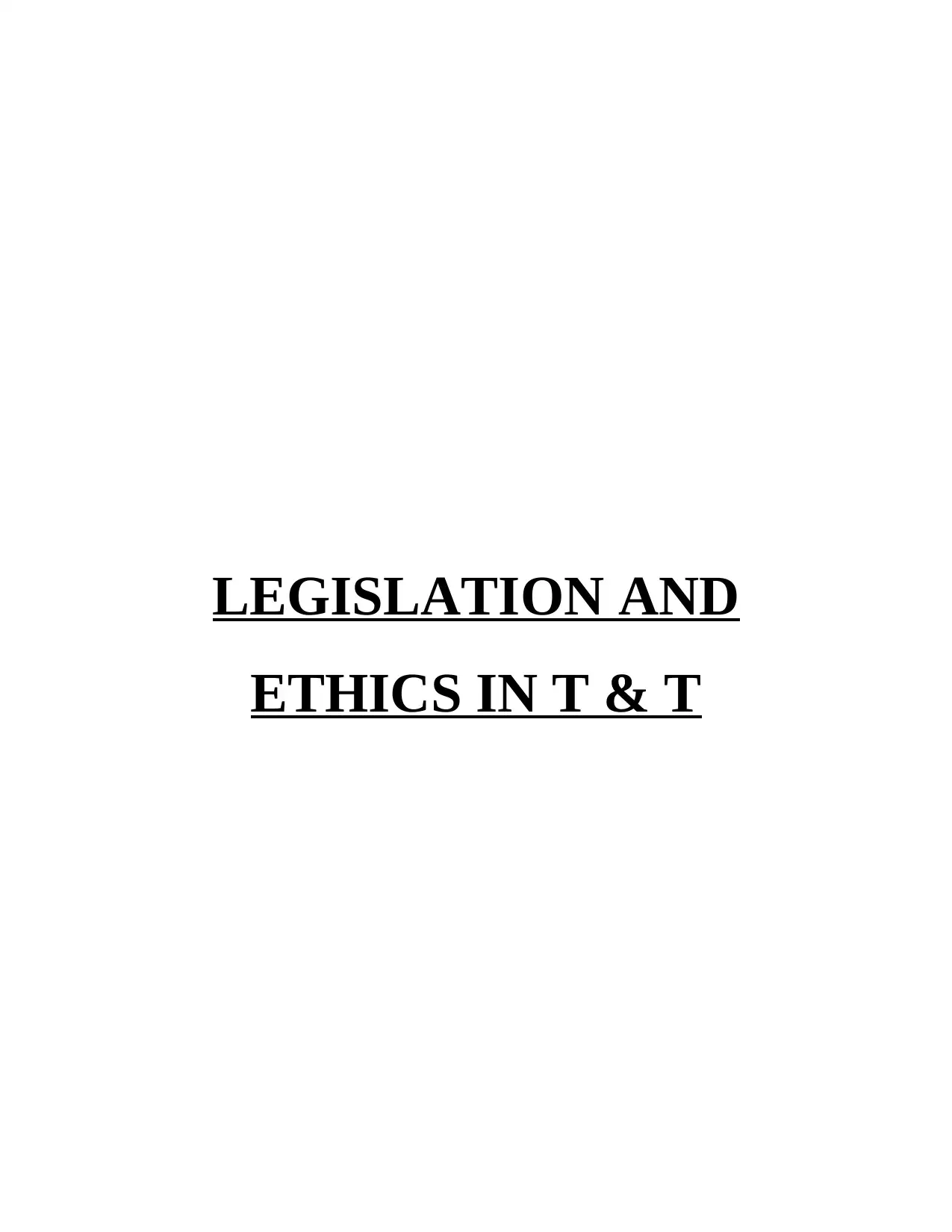
LEGISLATION AND
ETHICS IN T & T
ETHICS IN T & T
Secure Best Marks with AI Grader
Need help grading? Try our AI Grader for instant feedback on your assignments.
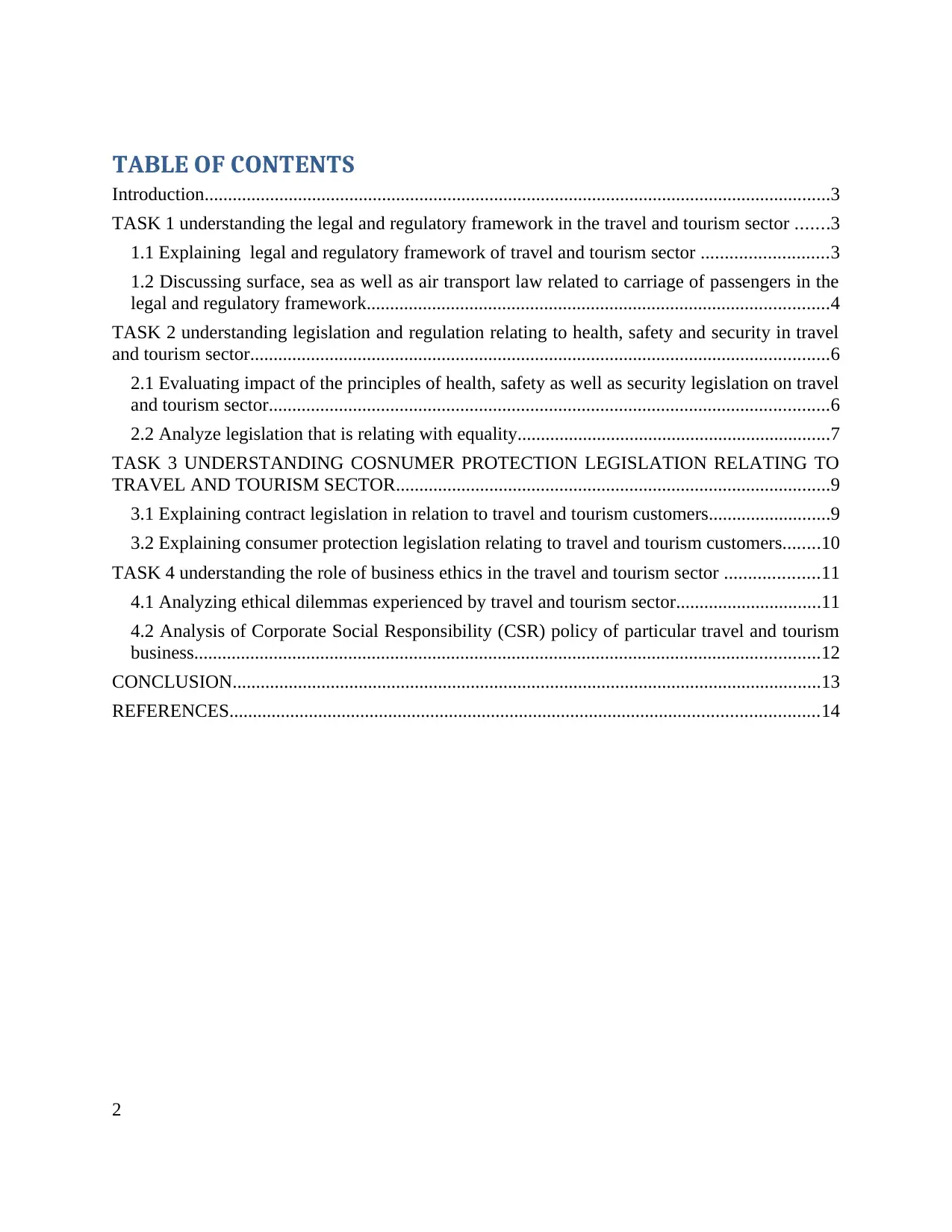
TABLE OF CONTENTS
Introduction......................................................................................................................................3
TASK 1 understanding the legal and regulatory framework in the travel and tourism sector .......3
1.1 Explaining legal and regulatory framework of travel and tourism sector ...........................3
1.2 Discussing surface, sea as well as air transport law related to carriage of passengers in the
legal and regulatory framework...................................................................................................4
TASK 2 understanding legislation and regulation relating to health, safety and security in travel
and tourism sector............................................................................................................................6
2.1 Evaluating impact of the principles of health, safety as well as security legislation on travel
and tourism sector........................................................................................................................6
2.2 Analyze legislation that is relating with equality...................................................................7
TASK 3 UNDERSTANDING COSNUMER PROTECTION LEGISLATION RELATING TO
TRAVEL AND TOURISM SECTOR.............................................................................................9
3.1 Explaining contract legislation in relation to travel and tourism customers..........................9
3.2 Explaining consumer protection legislation relating to travel and tourism customers........10
TASK 4 understanding the role of business ethics in the travel and tourism sector ....................11
4.1 Analyzing ethical dilemmas experienced by travel and tourism sector...............................11
4.2 Analysis of Corporate Social Responsibility (CSR) policy of particular travel and tourism
business......................................................................................................................................12
CONCLUSION..............................................................................................................................13
REFERENCES..............................................................................................................................14
2
Introduction......................................................................................................................................3
TASK 1 understanding the legal and regulatory framework in the travel and tourism sector .......3
1.1 Explaining legal and regulatory framework of travel and tourism sector ...........................3
1.2 Discussing surface, sea as well as air transport law related to carriage of passengers in the
legal and regulatory framework...................................................................................................4
TASK 2 understanding legislation and regulation relating to health, safety and security in travel
and tourism sector............................................................................................................................6
2.1 Evaluating impact of the principles of health, safety as well as security legislation on travel
and tourism sector........................................................................................................................6
2.2 Analyze legislation that is relating with equality...................................................................7
TASK 3 UNDERSTANDING COSNUMER PROTECTION LEGISLATION RELATING TO
TRAVEL AND TOURISM SECTOR.............................................................................................9
3.1 Explaining contract legislation in relation to travel and tourism customers..........................9
3.2 Explaining consumer protection legislation relating to travel and tourism customers........10
TASK 4 understanding the role of business ethics in the travel and tourism sector ....................11
4.1 Analyzing ethical dilemmas experienced by travel and tourism sector...............................11
4.2 Analysis of Corporate Social Responsibility (CSR) policy of particular travel and tourism
business......................................................................................................................................12
CONCLUSION..............................................................................................................................13
REFERENCES..............................................................................................................................14
2
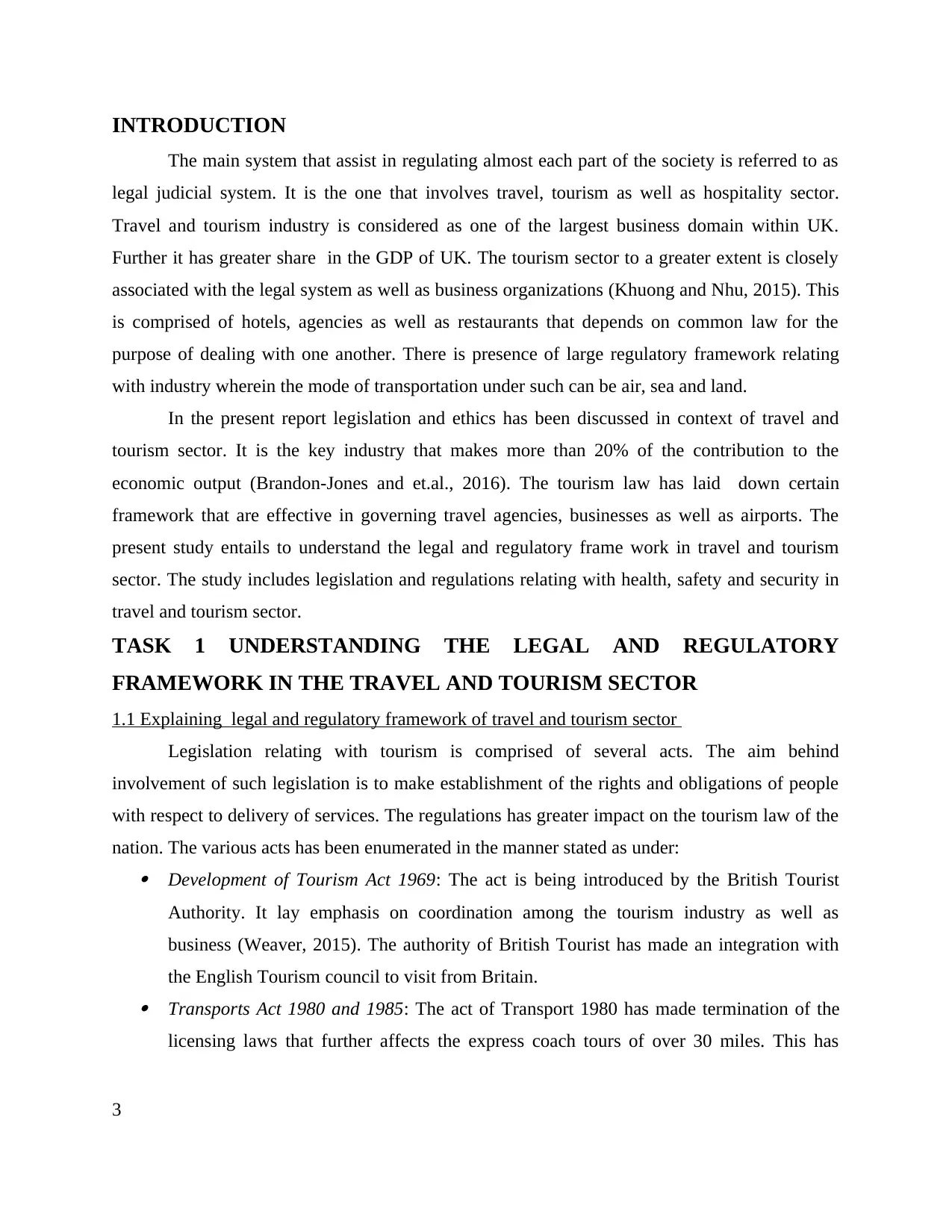
INTRODUCTION
The main system that assist in regulating almost each part of the society is referred to as
legal judicial system. It is the one that involves travel, tourism as well as hospitality sector.
Travel and tourism industry is considered as one of the largest business domain within UK.
Further it has greater share in the GDP of UK. The tourism sector to a greater extent is closely
associated with the legal system as well as business organizations (Khuong and Nhu, 2015). This
is comprised of hotels, agencies as well as restaurants that depends on common law for the
purpose of dealing with one another. There is presence of large regulatory framework relating
with industry wherein the mode of transportation under such can be air, sea and land.
In the present report legislation and ethics has been discussed in context of travel and
tourism sector. It is the key industry that makes more than 20% of the contribution to the
economic output (Brandon-Jones and et.al., 2016). The tourism law has laid down certain
framework that are effective in governing travel agencies, businesses as well as airports. The
present study entails to understand the legal and regulatory frame work in travel and tourism
sector. The study includes legislation and regulations relating with health, safety and security in
travel and tourism sector.
TASK 1 UNDERSTANDING THE LEGAL AND REGULATORY
FRAMEWORK IN THE TRAVEL AND TOURISM SECTOR
1.1 Explaining legal and regulatory framework of travel and tourism sector
Legislation relating with tourism is comprised of several acts. The aim behind
involvement of such legislation is to make establishment of the rights and obligations of people
with respect to delivery of services. The regulations has greater impact on the tourism law of the
nation. The various acts has been enumerated in the manner stated as under: Development of Tourism Act 1969: The act is being introduced by the British Tourist
Authority. It lay emphasis on coordination among the tourism industry as well as
business (Weaver, 2015). The authority of British Tourist has made an integration with
the English Tourism council to visit from Britain. Transports Act 1980 and 1985: The act of Transport 1980 has made termination of the
licensing laws that further affects the express coach tours of over 30 miles. This has
3
The main system that assist in regulating almost each part of the society is referred to as
legal judicial system. It is the one that involves travel, tourism as well as hospitality sector.
Travel and tourism industry is considered as one of the largest business domain within UK.
Further it has greater share in the GDP of UK. The tourism sector to a greater extent is closely
associated with the legal system as well as business organizations (Khuong and Nhu, 2015). This
is comprised of hotels, agencies as well as restaurants that depends on common law for the
purpose of dealing with one another. There is presence of large regulatory framework relating
with industry wherein the mode of transportation under such can be air, sea and land.
In the present report legislation and ethics has been discussed in context of travel and
tourism sector. It is the key industry that makes more than 20% of the contribution to the
economic output (Brandon-Jones and et.al., 2016). The tourism law has laid down certain
framework that are effective in governing travel agencies, businesses as well as airports. The
present study entails to understand the legal and regulatory frame work in travel and tourism
sector. The study includes legislation and regulations relating with health, safety and security in
travel and tourism sector.
TASK 1 UNDERSTANDING THE LEGAL AND REGULATORY
FRAMEWORK IN THE TRAVEL AND TOURISM SECTOR
1.1 Explaining legal and regulatory framework of travel and tourism sector
Legislation relating with tourism is comprised of several acts. The aim behind
involvement of such legislation is to make establishment of the rights and obligations of people
with respect to delivery of services. The regulations has greater impact on the tourism law of the
nation. The various acts has been enumerated in the manner stated as under: Development of Tourism Act 1969: The act is being introduced by the British Tourist
Authority. It lay emphasis on coordination among the tourism industry as well as
business (Weaver, 2015). The authority of British Tourist has made an integration with
the English Tourism council to visit from Britain. Transports Act 1980 and 1985: The act of Transport 1980 has made termination of the
licensing laws that further affects the express coach tours of over 30 miles. This has
3
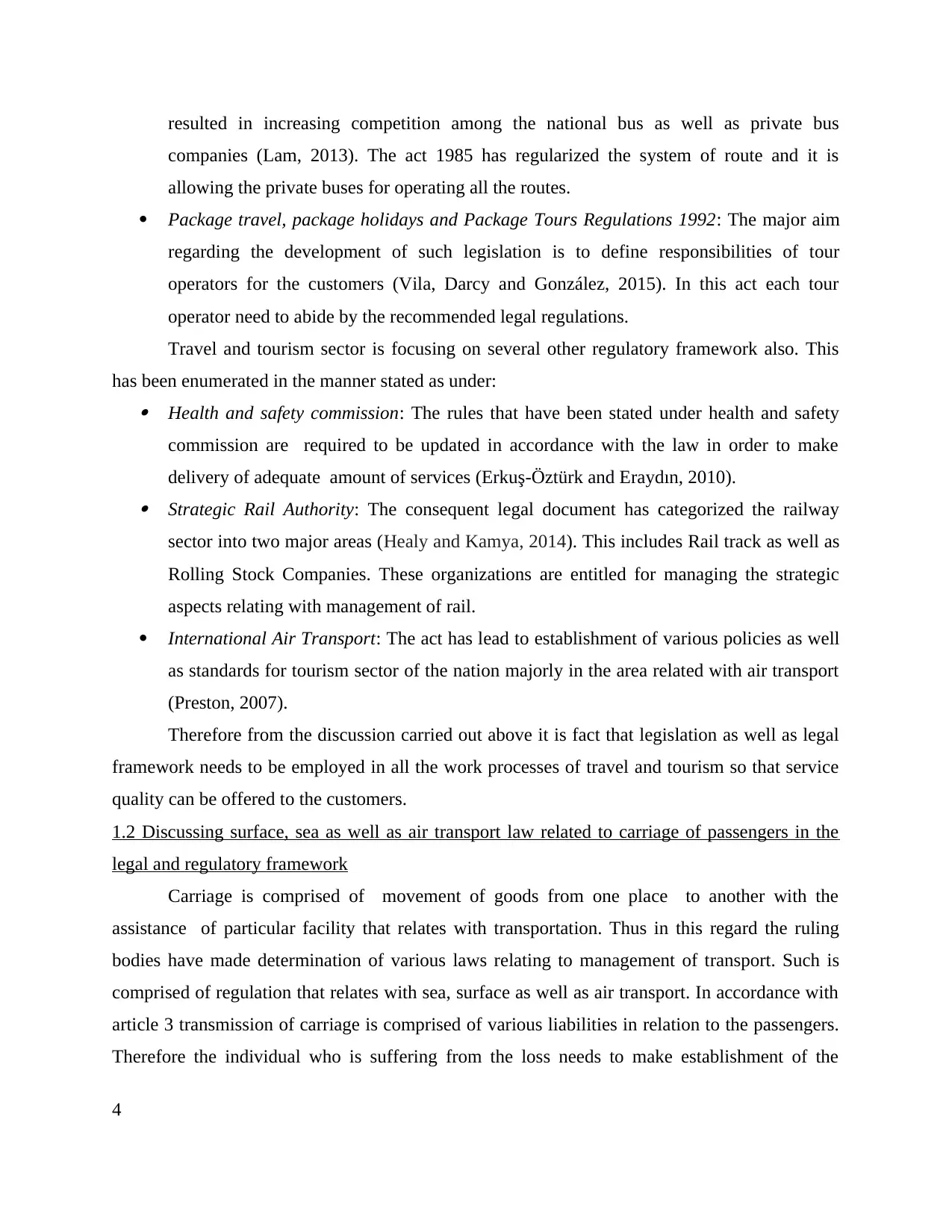
resulted in increasing competition among the national bus as well as private bus
companies (Lam, 2013). The act 1985 has regularized the system of route and it is
allowing the private buses for operating all the routes.
Package travel, package holidays and Package Tours Regulations 1992: The major aim
regarding the development of such legislation is to define responsibilities of tour
operators for the customers (Vila, Darcy and González, 2015). In this act each tour
operator need to abide by the recommended legal regulations.
Travel and tourism sector is focusing on several other regulatory framework also. This
has been enumerated in the manner stated as under: Health and safety commission: The rules that have been stated under health and safety
commission are required to be updated in accordance with the law in order to make
delivery of adequate amount of services (Erkuş-Öztürk and Eraydın, 2010). Strategic Rail Authority: The consequent legal document has categorized the railway
sector into two major areas (Healy and Kamya, 2014). This includes Rail track as well as
Rolling Stock Companies. These organizations are entitled for managing the strategic
aspects relating with management of rail.
International Air Transport: The act has lead to establishment of various policies as well
as standards for tourism sector of the nation majorly in the area related with air transport
(Preston, 2007).
Therefore from the discussion carried out above it is fact that legislation as well as legal
framework needs to be employed in all the work processes of travel and tourism so that service
quality can be offered to the customers.
1.2 Discussing surface, sea as well as air transport law related to carriage of passengers in the
legal and regulatory framework
Carriage is comprised of movement of goods from one place to another with the
assistance of particular facility that relates with transportation. Thus in this regard the ruling
bodies have made determination of various laws relating to management of transport. Such is
comprised of regulation that relates with sea, surface as well as air transport. In accordance with
article 3 transmission of carriage is comprised of various liabilities in relation to the passengers.
Therefore the individual who is suffering from the loss needs to make establishment of the
4
companies (Lam, 2013). The act 1985 has regularized the system of route and it is
allowing the private buses for operating all the routes.
Package travel, package holidays and Package Tours Regulations 1992: The major aim
regarding the development of such legislation is to define responsibilities of tour
operators for the customers (Vila, Darcy and González, 2015). In this act each tour
operator need to abide by the recommended legal regulations.
Travel and tourism sector is focusing on several other regulatory framework also. This
has been enumerated in the manner stated as under: Health and safety commission: The rules that have been stated under health and safety
commission are required to be updated in accordance with the law in order to make
delivery of adequate amount of services (Erkuş-Öztürk and Eraydın, 2010). Strategic Rail Authority: The consequent legal document has categorized the railway
sector into two major areas (Healy and Kamya, 2014). This includes Rail track as well as
Rolling Stock Companies. These organizations are entitled for managing the strategic
aspects relating with management of rail.
International Air Transport: The act has lead to establishment of various policies as well
as standards for tourism sector of the nation majorly in the area related with air transport
(Preston, 2007).
Therefore from the discussion carried out above it is fact that legislation as well as legal
framework needs to be employed in all the work processes of travel and tourism so that service
quality can be offered to the customers.
1.2 Discussing surface, sea as well as air transport law related to carriage of passengers in the
legal and regulatory framework
Carriage is comprised of movement of goods from one place to another with the
assistance of particular facility that relates with transportation. Thus in this regard the ruling
bodies have made determination of various laws relating to management of transport. Such is
comprised of regulation that relates with sea, surface as well as air transport. In accordance with
article 3 transmission of carriage is comprised of various liabilities in relation to the passengers.
Therefore the individual who is suffering from the loss needs to make establishment of the
4
Secure Best Marks with AI Grader
Need help grading? Try our AI Grader for instant feedback on your assignments.
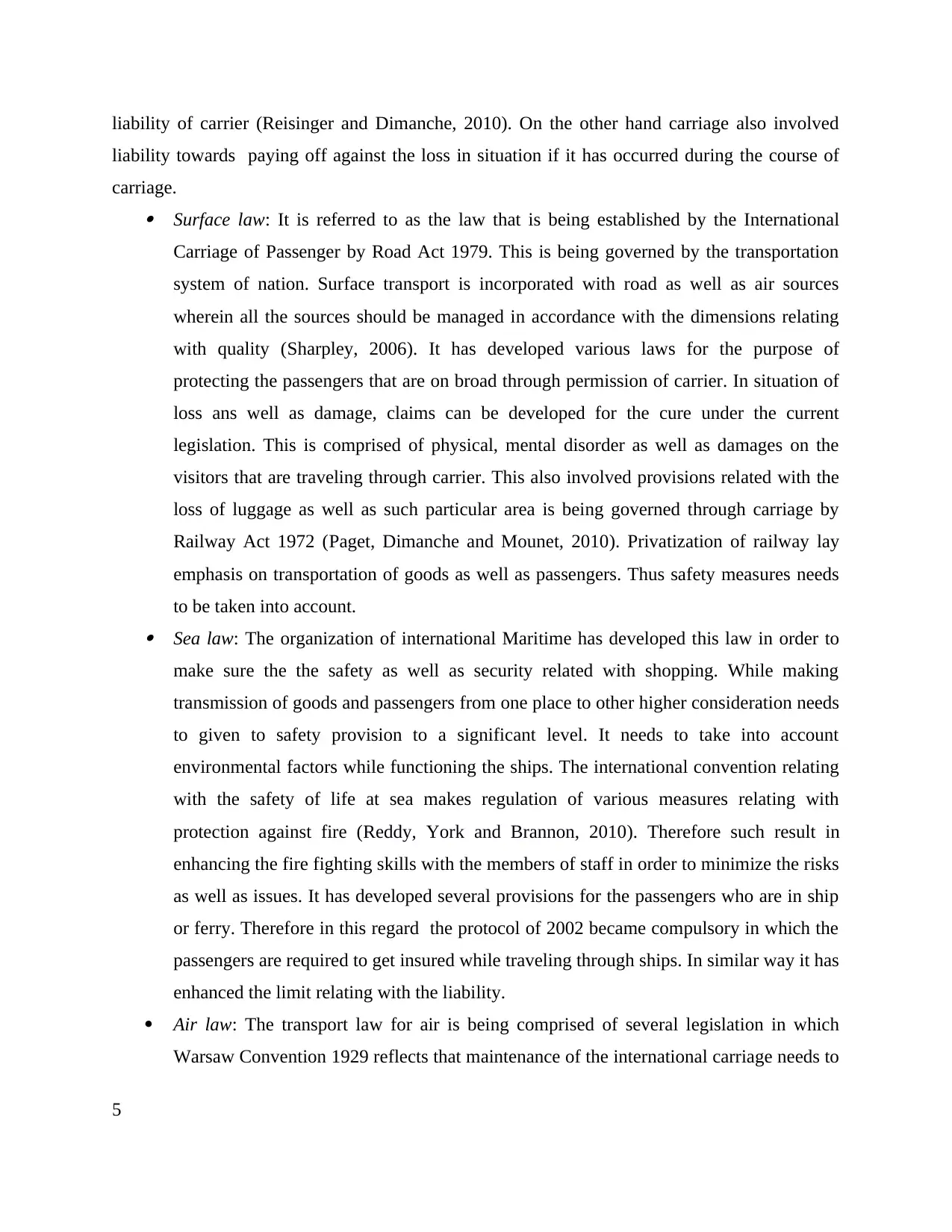
liability of carrier (Reisinger and Dimanche, 2010). On the other hand carriage also involved
liability towards paying off against the loss in situation if it has occurred during the course of
carriage. Surface law: It is referred to as the law that is being established by the International
Carriage of Passenger by Road Act 1979. This is being governed by the transportation
system of nation. Surface transport is incorporated with road as well as air sources
wherein all the sources should be managed in accordance with the dimensions relating
with quality (Sharpley, 2006). It has developed various laws for the purpose of
protecting the passengers that are on broad through permission of carrier. In situation of
loss ans well as damage, claims can be developed for the cure under the current
legislation. This is comprised of physical, mental disorder as well as damages on the
visitors that are traveling through carrier. This also involved provisions related with the
loss of luggage as well as such particular area is being governed through carriage by
Railway Act 1972 (Paget, Dimanche and Mounet, 2010). Privatization of railway lay
emphasis on transportation of goods as well as passengers. Thus safety measures needs
to be taken into account. Sea law: The organization of international Maritime has developed this law in order to
make sure the the safety as well as security related with shopping. While making
transmission of goods and passengers from one place to other higher consideration needs
to given to safety provision to a significant level. It needs to take into account
environmental factors while functioning the ships. The international convention relating
with the safety of life at sea makes regulation of various measures relating with
protection against fire (Reddy, York and Brannon, 2010). Therefore such result in
enhancing the fire fighting skills with the members of staff in order to minimize the risks
as well as issues. It has developed several provisions for the passengers who are in ship
or ferry. Therefore in this regard the protocol of 2002 became compulsory in which the
passengers are required to get insured while traveling through ships. In similar way it has
enhanced the limit relating with the liability.
Air law: The transport law for air is being comprised of several legislation in which
Warsaw Convention 1929 reflects that maintenance of the international carriage needs to
5
liability towards paying off against the loss in situation if it has occurred during the course of
carriage. Surface law: It is referred to as the law that is being established by the International
Carriage of Passenger by Road Act 1979. This is being governed by the transportation
system of nation. Surface transport is incorporated with road as well as air sources
wherein all the sources should be managed in accordance with the dimensions relating
with quality (Sharpley, 2006). It has developed various laws for the purpose of
protecting the passengers that are on broad through permission of carrier. In situation of
loss ans well as damage, claims can be developed for the cure under the current
legislation. This is comprised of physical, mental disorder as well as damages on the
visitors that are traveling through carrier. This also involved provisions related with the
loss of luggage as well as such particular area is being governed through carriage by
Railway Act 1972 (Paget, Dimanche and Mounet, 2010). Privatization of railway lay
emphasis on transportation of goods as well as passengers. Thus safety measures needs
to be taken into account. Sea law: The organization of international Maritime has developed this law in order to
make sure the the safety as well as security related with shopping. While making
transmission of goods and passengers from one place to other higher consideration needs
to given to safety provision to a significant level. It needs to take into account
environmental factors while functioning the ships. The international convention relating
with the safety of life at sea makes regulation of various measures relating with
protection against fire (Reddy, York and Brannon, 2010). Therefore such result in
enhancing the fire fighting skills with the members of staff in order to minimize the risks
as well as issues. It has developed several provisions for the passengers who are in ship
or ferry. Therefore in this regard the protocol of 2002 became compulsory in which the
passengers are required to get insured while traveling through ships. In similar way it has
enhanced the limit relating with the liability.
Air law: The transport law for air is being comprised of several legislation in which
Warsaw Convention 1929 reflects that maintenance of the international carriage needs to
5
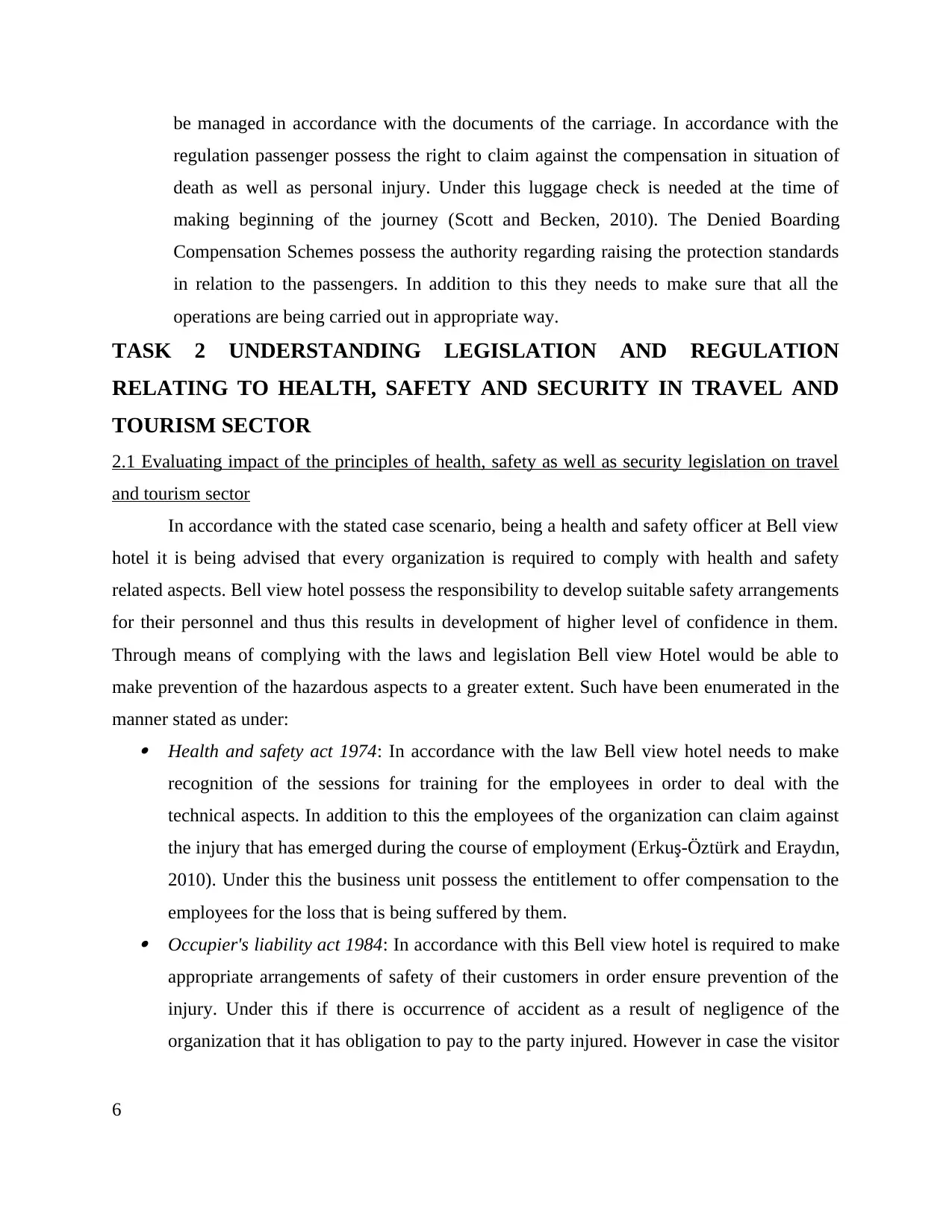
be managed in accordance with the documents of the carriage. In accordance with the
regulation passenger possess the right to claim against the compensation in situation of
death as well as personal injury. Under this luggage check is needed at the time of
making beginning of the journey (Scott and Becken, 2010). The Denied Boarding
Compensation Schemes possess the authority regarding raising the protection standards
in relation to the passengers. In addition to this they needs to make sure that all the
operations are being carried out in appropriate way.
TASK 2 UNDERSTANDING LEGISLATION AND REGULATION
RELATING TO HEALTH, SAFETY AND SECURITY IN TRAVEL AND
TOURISM SECTOR
2.1 Evaluating impact of the principles of health, safety as well as security legislation on travel
and tourism sector
In accordance with the stated case scenario, being a health and safety officer at Bell view
hotel it is being advised that every organization is required to comply with health and safety
related aspects. Bell view hotel possess the responsibility to develop suitable safety arrangements
for their personnel and thus this results in development of higher level of confidence in them.
Through means of complying with the laws and legislation Bell view Hotel would be able to
make prevention of the hazardous aspects to a greater extent. Such have been enumerated in the
manner stated as under: Health and safety act 1974: In accordance with the law Bell view hotel needs to make
recognition of the sessions for training for the employees in order to deal with the
technical aspects. In addition to this the employees of the organization can claim against
the injury that has emerged during the course of employment (Erkuş-Öztürk and Eraydın,
2010). Under this the business unit possess the entitlement to offer compensation to the
employees for the loss that is being suffered by them. Occupier's liability act 1984: In accordance with this Bell view hotel is required to make
appropriate arrangements of safety of their customers in order ensure prevention of the
injury. Under this if there is occurrence of accident as a result of negligence of the
organization that it has obligation to pay to the party injured. However in case the visitor
6
regulation passenger possess the right to claim against the compensation in situation of
death as well as personal injury. Under this luggage check is needed at the time of
making beginning of the journey (Scott and Becken, 2010). The Denied Boarding
Compensation Schemes possess the authority regarding raising the protection standards
in relation to the passengers. In addition to this they needs to make sure that all the
operations are being carried out in appropriate way.
TASK 2 UNDERSTANDING LEGISLATION AND REGULATION
RELATING TO HEALTH, SAFETY AND SECURITY IN TRAVEL AND
TOURISM SECTOR
2.1 Evaluating impact of the principles of health, safety as well as security legislation on travel
and tourism sector
In accordance with the stated case scenario, being a health and safety officer at Bell view
hotel it is being advised that every organization is required to comply with health and safety
related aspects. Bell view hotel possess the responsibility to develop suitable safety arrangements
for their personnel and thus this results in development of higher level of confidence in them.
Through means of complying with the laws and legislation Bell view Hotel would be able to
make prevention of the hazardous aspects to a greater extent. Such have been enumerated in the
manner stated as under: Health and safety act 1974: In accordance with the law Bell view hotel needs to make
recognition of the sessions for training for the employees in order to deal with the
technical aspects. In addition to this the employees of the organization can claim against
the injury that has emerged during the course of employment (Erkuş-Öztürk and Eraydın,
2010). Under this the business unit possess the entitlement to offer compensation to the
employees for the loss that is being suffered by them. Occupier's liability act 1984: In accordance with this Bell view hotel is required to make
appropriate arrangements of safety of their customers in order ensure prevention of the
injury. Under this if there is occurrence of accident as a result of negligence of the
organization that it has obligation to pay to the party injured. However in case the visitor
6
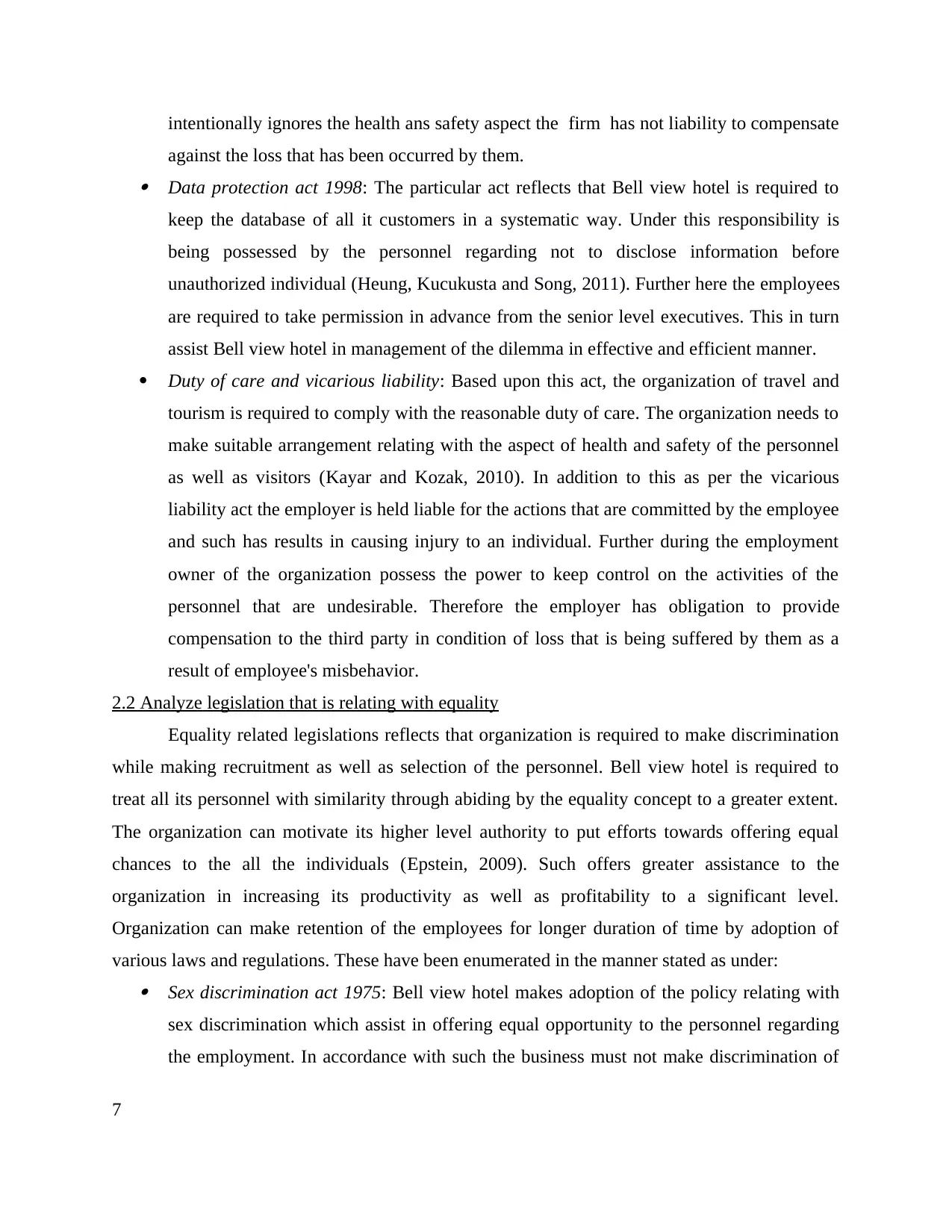
intentionally ignores the health ans safety aspect the firm has not liability to compensate
against the loss that has been occurred by them. Data protection act 1998: The particular act reflects that Bell view hotel is required to
keep the database of all it customers in a systematic way. Under this responsibility is
being possessed by the personnel regarding not to disclose information before
unauthorized individual (Heung, Kucukusta and Song, 2011). Further here the employees
are required to take permission in advance from the senior level executives. This in turn
assist Bell view hotel in management of the dilemma in effective and efficient manner.
Duty of care and vicarious liability: Based upon this act, the organization of travel and
tourism is required to comply with the reasonable duty of care. The organization needs to
make suitable arrangement relating with the aspect of health and safety of the personnel
as well as visitors (Kayar and Kozak, 2010). In addition to this as per the vicarious
liability act the employer is held liable for the actions that are committed by the employee
and such has results in causing injury to an individual. Further during the employment
owner of the organization possess the power to keep control on the activities of the
personnel that are undesirable. Therefore the employer has obligation to provide
compensation to the third party in condition of loss that is being suffered by them as a
result of employee's misbehavior.
2.2 Analyze legislation that is relating with equality
Equality related legislations reflects that organization is required to make discrimination
while making recruitment as well as selection of the personnel. Bell view hotel is required to
treat all its personnel with similarity through abiding by the equality concept to a greater extent.
The organization can motivate its higher level authority to put efforts towards offering equal
chances to the all the individuals (Epstein, 2009). Such offers greater assistance to the
organization in increasing its productivity as well as profitability to a significant level.
Organization can make retention of the employees for longer duration of time by adoption of
various laws and regulations. These have been enumerated in the manner stated as under: Sex discrimination act 1975: Bell view hotel makes adoption of the policy relating with
sex discrimination which assist in offering equal opportunity to the personnel regarding
the employment. In accordance with such the business must not make discrimination of
7
against the loss that has been occurred by them. Data protection act 1998: The particular act reflects that Bell view hotel is required to
keep the database of all it customers in a systematic way. Under this responsibility is
being possessed by the personnel regarding not to disclose information before
unauthorized individual (Heung, Kucukusta and Song, 2011). Further here the employees
are required to take permission in advance from the senior level executives. This in turn
assist Bell view hotel in management of the dilemma in effective and efficient manner.
Duty of care and vicarious liability: Based upon this act, the organization of travel and
tourism is required to comply with the reasonable duty of care. The organization needs to
make suitable arrangement relating with the aspect of health and safety of the personnel
as well as visitors (Kayar and Kozak, 2010). In addition to this as per the vicarious
liability act the employer is held liable for the actions that are committed by the employee
and such has results in causing injury to an individual. Further during the employment
owner of the organization possess the power to keep control on the activities of the
personnel that are undesirable. Therefore the employer has obligation to provide
compensation to the third party in condition of loss that is being suffered by them as a
result of employee's misbehavior.
2.2 Analyze legislation that is relating with equality
Equality related legislations reflects that organization is required to make discrimination
while making recruitment as well as selection of the personnel. Bell view hotel is required to
treat all its personnel with similarity through abiding by the equality concept to a greater extent.
The organization can motivate its higher level authority to put efforts towards offering equal
chances to the all the individuals (Epstein, 2009). Such offers greater assistance to the
organization in increasing its productivity as well as profitability to a significant level.
Organization can make retention of the employees for longer duration of time by adoption of
various laws and regulations. These have been enumerated in the manner stated as under: Sex discrimination act 1975: Bell view hotel makes adoption of the policy relating with
sex discrimination which assist in offering equal opportunity to the personnel regarding
the employment. In accordance with such the business must not make discrimination of
7
Paraphrase This Document
Need a fresh take? Get an instant paraphrase of this document with our AI Paraphraser
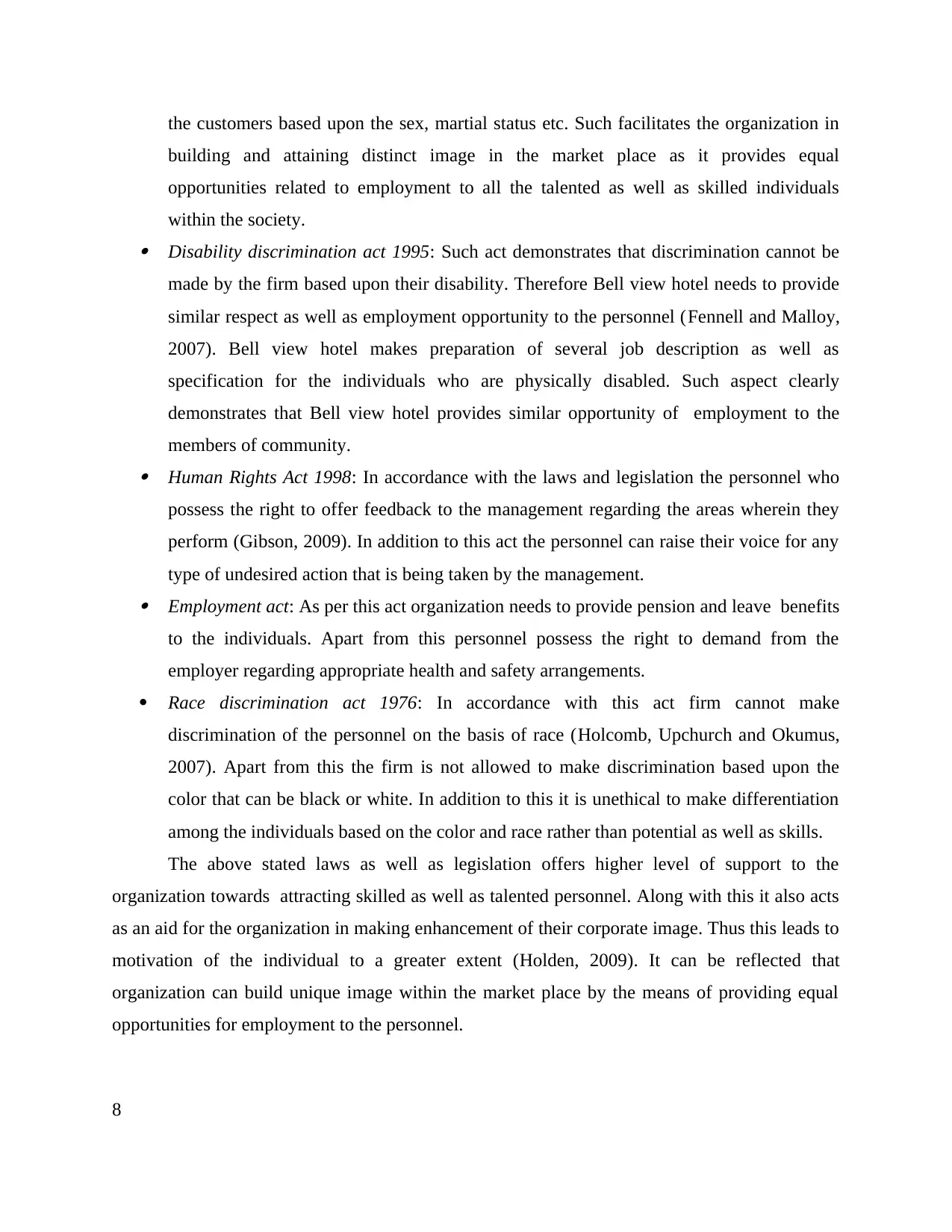
the customers based upon the sex, martial status etc. Such facilitates the organization in
building and attaining distinct image in the market place as it provides equal
opportunities related to employment to all the talented as well as skilled individuals
within the society. Disability discrimination act 1995: Such act demonstrates that discrimination cannot be
made by the firm based upon their disability. Therefore Bell view hotel needs to provide
similar respect as well as employment opportunity to the personnel (Fennell and Malloy,
2007). Bell view hotel makes preparation of several job description as well as
specification for the individuals who are physically disabled. Such aspect clearly
demonstrates that Bell view hotel provides similar opportunity of employment to the
members of community. Human Rights Act 1998: In accordance with the laws and legislation the personnel who
possess the right to offer feedback to the management regarding the areas wherein they
perform (Gibson, 2009). In addition to this act the personnel can raise their voice for any
type of undesired action that is being taken by the management. Employment act: As per this act organization needs to provide pension and leave benefits
to the individuals. Apart from this personnel possess the right to demand from the
employer regarding appropriate health and safety arrangements.
Race discrimination act 1976: In accordance with this act firm cannot make
discrimination of the personnel on the basis of race (Holcomb, Upchurch and Okumus,
2007). Apart from this the firm is not allowed to make discrimination based upon the
color that can be black or white. In addition to this it is unethical to make differentiation
among the individuals based on the color and race rather than potential as well as skills.
The above stated laws as well as legislation offers higher level of support to the
organization towards attracting skilled as well as talented personnel. Along with this it also acts
as an aid for the organization in making enhancement of their corporate image. Thus this leads to
motivation of the individual to a greater extent (Holden, 2009). It can be reflected that
organization can build unique image within the market place by the means of providing equal
opportunities for employment to the personnel.
8
building and attaining distinct image in the market place as it provides equal
opportunities related to employment to all the talented as well as skilled individuals
within the society. Disability discrimination act 1995: Such act demonstrates that discrimination cannot be
made by the firm based upon their disability. Therefore Bell view hotel needs to provide
similar respect as well as employment opportunity to the personnel (Fennell and Malloy,
2007). Bell view hotel makes preparation of several job description as well as
specification for the individuals who are physically disabled. Such aspect clearly
demonstrates that Bell view hotel provides similar opportunity of employment to the
members of community. Human Rights Act 1998: In accordance with the laws and legislation the personnel who
possess the right to offer feedback to the management regarding the areas wherein they
perform (Gibson, 2009). In addition to this act the personnel can raise their voice for any
type of undesired action that is being taken by the management. Employment act: As per this act organization needs to provide pension and leave benefits
to the individuals. Apart from this personnel possess the right to demand from the
employer regarding appropriate health and safety arrangements.
Race discrimination act 1976: In accordance with this act firm cannot make
discrimination of the personnel on the basis of race (Holcomb, Upchurch and Okumus,
2007). Apart from this the firm is not allowed to make discrimination based upon the
color that can be black or white. In addition to this it is unethical to make differentiation
among the individuals based on the color and race rather than potential as well as skills.
The above stated laws as well as legislation offers higher level of support to the
organization towards attracting skilled as well as talented personnel. Along with this it also acts
as an aid for the organization in making enhancement of their corporate image. Thus this leads to
motivation of the individual to a greater extent (Holden, 2009). It can be reflected that
organization can build unique image within the market place by the means of providing equal
opportunities for employment to the personnel.
8
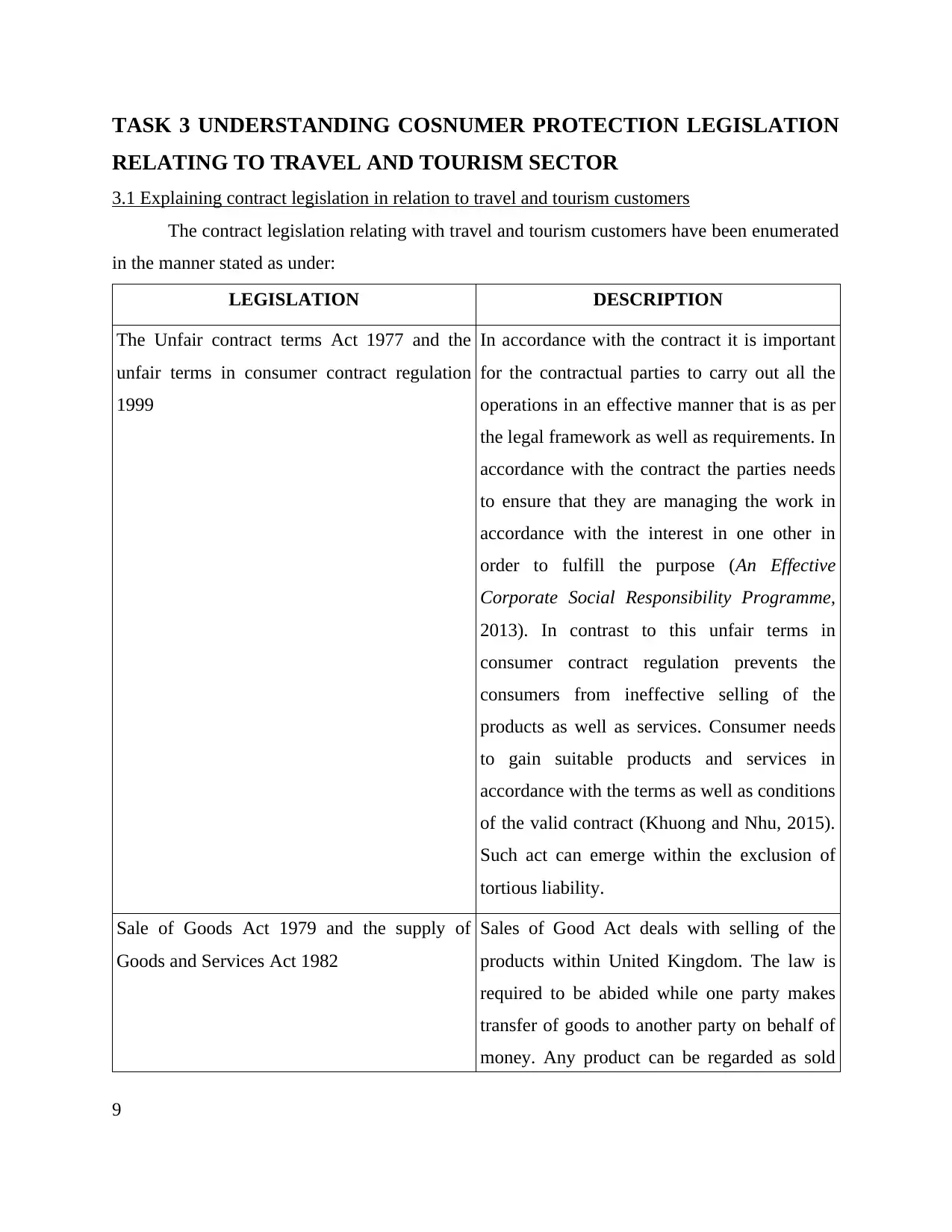
TASK 3 UNDERSTANDING COSNUMER PROTECTION LEGISLATION
RELATING TO TRAVEL AND TOURISM SECTOR
3.1 Explaining contract legislation in relation to travel and tourism customers
The contract legislation relating with travel and tourism customers have been enumerated
in the manner stated as under:
LEGISLATION DESCRIPTION
The Unfair contract terms Act 1977 and the
unfair terms in consumer contract regulation
1999
In accordance with the contract it is important
for the contractual parties to carry out all the
operations in an effective manner that is as per
the legal framework as well as requirements. In
accordance with the contract the parties needs
to ensure that they are managing the work in
accordance with the interest in one other in
order to fulfill the purpose (An Effective
Corporate Social Responsibility Programme,
2013). In contrast to this unfair terms in
consumer contract regulation prevents the
consumers from ineffective selling of the
products as well as services. Consumer needs
to gain suitable products and services in
accordance with the terms as well as conditions
of the valid contract (Khuong and Nhu, 2015).
Such act can emerge within the exclusion of
tortious liability.
Sale of Goods Act 1979 and the supply of
Goods and Services Act 1982
Sales of Good Act deals with selling of the
products within United Kingdom. The law is
required to be abided while one party makes
transfer of goods to another party on behalf of
money. Any product can be regarded as sold
9
RELATING TO TRAVEL AND TOURISM SECTOR
3.1 Explaining contract legislation in relation to travel and tourism customers
The contract legislation relating with travel and tourism customers have been enumerated
in the manner stated as under:
LEGISLATION DESCRIPTION
The Unfair contract terms Act 1977 and the
unfair terms in consumer contract regulation
1999
In accordance with the contract it is important
for the contractual parties to carry out all the
operations in an effective manner that is as per
the legal framework as well as requirements. In
accordance with the contract the parties needs
to ensure that they are managing the work in
accordance with the interest in one other in
order to fulfill the purpose (An Effective
Corporate Social Responsibility Programme,
2013). In contrast to this unfair terms in
consumer contract regulation prevents the
consumers from ineffective selling of the
products as well as services. Consumer needs
to gain suitable products and services in
accordance with the terms as well as conditions
of the valid contract (Khuong and Nhu, 2015).
Such act can emerge within the exclusion of
tortious liability.
Sale of Goods Act 1979 and the supply of
Goods and Services Act 1982
Sales of Good Act deals with selling of the
products within United Kingdom. The law is
required to be abided while one party makes
transfer of goods to another party on behalf of
money. Any product can be regarded as sold
9
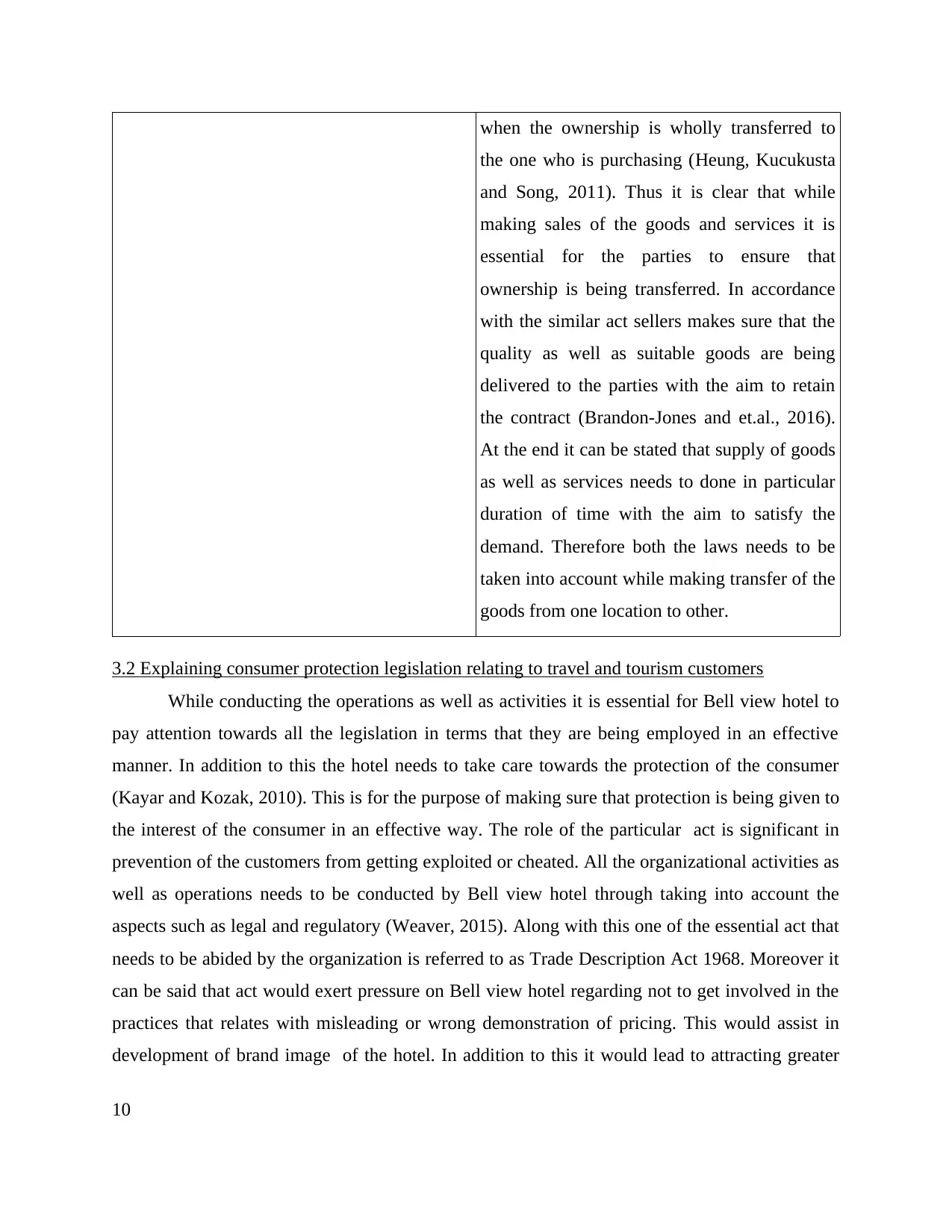
when the ownership is wholly transferred to
the one who is purchasing (Heung, Kucukusta
and Song, 2011). Thus it is clear that while
making sales of the goods and services it is
essential for the parties to ensure that
ownership is being transferred. In accordance
with the similar act sellers makes sure that the
quality as well as suitable goods are being
delivered to the parties with the aim to retain
the contract (Brandon-Jones and et.al., 2016).
At the end it can be stated that supply of goods
as well as services needs to done in particular
duration of time with the aim to satisfy the
demand. Therefore both the laws needs to be
taken into account while making transfer of the
goods from one location to other.
3.2 Explaining consumer protection legislation relating to travel and tourism customers
While conducting the operations as well as activities it is essential for Bell view hotel to
pay attention towards all the legislation in terms that they are being employed in an effective
manner. In addition to this the hotel needs to take care towards the protection of the consumer
(Kayar and Kozak, 2010). This is for the purpose of making sure that protection is being given to
the interest of the consumer in an effective way. The role of the particular act is significant in
prevention of the customers from getting exploited or cheated. All the organizational activities as
well as operations needs to be conducted by Bell view hotel through taking into account the
aspects such as legal and regulatory (Weaver, 2015). Along with this one of the essential act that
needs to be abided by the organization is referred to as Trade Description Act 1968. Moreover it
can be said that act would exert pressure on Bell view hotel regarding not to get involved in the
practices that relates with misleading or wrong demonstration of pricing. This would assist in
development of brand image of the hotel. In addition to this it would lead to attracting greater
10
the one who is purchasing (Heung, Kucukusta
and Song, 2011). Thus it is clear that while
making sales of the goods and services it is
essential for the parties to ensure that
ownership is being transferred. In accordance
with the similar act sellers makes sure that the
quality as well as suitable goods are being
delivered to the parties with the aim to retain
the contract (Brandon-Jones and et.al., 2016).
At the end it can be stated that supply of goods
as well as services needs to done in particular
duration of time with the aim to satisfy the
demand. Therefore both the laws needs to be
taken into account while making transfer of the
goods from one location to other.
3.2 Explaining consumer protection legislation relating to travel and tourism customers
While conducting the operations as well as activities it is essential for Bell view hotel to
pay attention towards all the legislation in terms that they are being employed in an effective
manner. In addition to this the hotel needs to take care towards the protection of the consumer
(Kayar and Kozak, 2010). This is for the purpose of making sure that protection is being given to
the interest of the consumer in an effective way. The role of the particular act is significant in
prevention of the customers from getting exploited or cheated. All the organizational activities as
well as operations needs to be conducted by Bell view hotel through taking into account the
aspects such as legal and regulatory (Weaver, 2015). Along with this one of the essential act that
needs to be abided by the organization is referred to as Trade Description Act 1968. Moreover it
can be said that act would exert pressure on Bell view hotel regarding not to get involved in the
practices that relates with misleading or wrong demonstration of pricing. This would assist in
development of brand image of the hotel. In addition to this it would lead to attracting greater
10
Secure Best Marks with AI Grader
Need help grading? Try our AI Grader for instant feedback on your assignments.
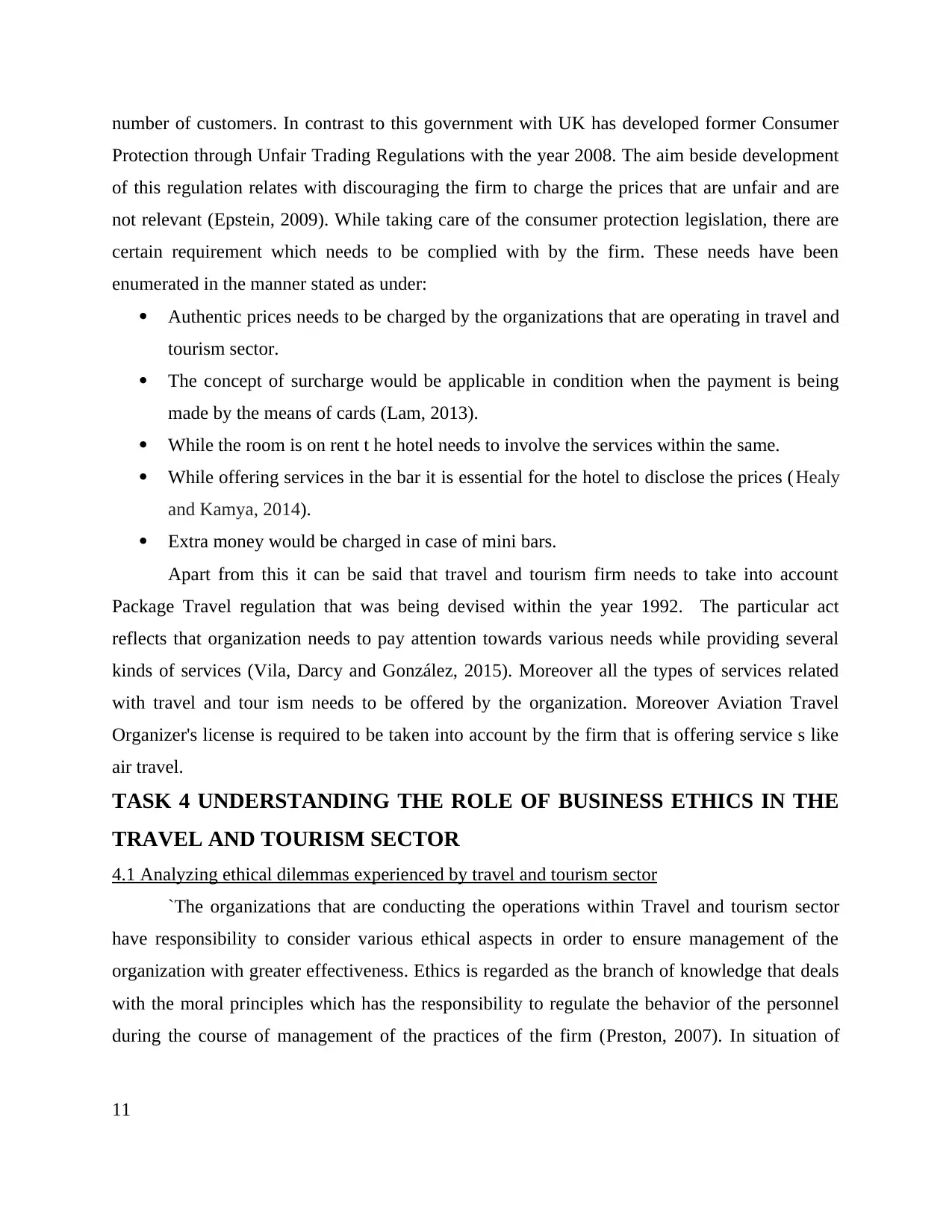
number of customers. In contrast to this government with UK has developed former Consumer
Protection through Unfair Trading Regulations with the year 2008. The aim beside development
of this regulation relates with discouraging the firm to charge the prices that are unfair and are
not relevant (Epstein, 2009). While taking care of the consumer protection legislation, there are
certain requirement which needs to be complied with by the firm. These needs have been
enumerated in the manner stated as under:
Authentic prices needs to be charged by the organizations that are operating in travel and
tourism sector.
The concept of surcharge would be applicable in condition when the payment is being
made by the means of cards (Lam, 2013).
While the room is on rent t he hotel needs to involve the services within the same.
While offering services in the bar it is essential for the hotel to disclose the prices ( Healy
and Kamya, 2014).
Extra money would be charged in case of mini bars.
Apart from this it can be said that travel and tourism firm needs to take into account
Package Travel regulation that was being devised within the year 1992. The particular act
reflects that organization needs to pay attention towards various needs while providing several
kinds of services (Vila, Darcy and González, 2015). Moreover all the types of services related
with travel and tour ism needs to be offered by the organization. Moreover Aviation Travel
Organizer's license is required to be taken into account by the firm that is offering service s like
air travel.
TASK 4 UNDERSTANDING THE ROLE OF BUSINESS ETHICS IN THE
TRAVEL AND TOURISM SECTOR
4.1 Analyzing ethical dilemmas experienced by travel and tourism sector
`The organizations that are conducting the operations within Travel and tourism sector
have responsibility to consider various ethical aspects in order to ensure management of the
organization with greater effectiveness. Ethics is regarded as the branch of knowledge that deals
with the moral principles which has the responsibility to regulate the behavior of the personnel
during the course of management of the practices of the firm (Preston, 2007). In situation of
11
Protection through Unfair Trading Regulations with the year 2008. The aim beside development
of this regulation relates with discouraging the firm to charge the prices that are unfair and are
not relevant (Epstein, 2009). While taking care of the consumer protection legislation, there are
certain requirement which needs to be complied with by the firm. These needs have been
enumerated in the manner stated as under:
Authentic prices needs to be charged by the organizations that are operating in travel and
tourism sector.
The concept of surcharge would be applicable in condition when the payment is being
made by the means of cards (Lam, 2013).
While the room is on rent t he hotel needs to involve the services within the same.
While offering services in the bar it is essential for the hotel to disclose the prices ( Healy
and Kamya, 2014).
Extra money would be charged in case of mini bars.
Apart from this it can be said that travel and tourism firm needs to take into account
Package Travel regulation that was being devised within the year 1992. The particular act
reflects that organization needs to pay attention towards various needs while providing several
kinds of services (Vila, Darcy and González, 2015). Moreover all the types of services related
with travel and tour ism needs to be offered by the organization. Moreover Aviation Travel
Organizer's license is required to be taken into account by the firm that is offering service s like
air travel.
TASK 4 UNDERSTANDING THE ROLE OF BUSINESS ETHICS IN THE
TRAVEL AND TOURISM SECTOR
4.1 Analyzing ethical dilemmas experienced by travel and tourism sector
`The organizations that are conducting the operations within Travel and tourism sector
have responsibility to consider various ethical aspects in order to ensure management of the
organization with greater effectiveness. Ethics is regarded as the branch of knowledge that deals
with the moral principles which has the responsibility to regulate the behavior of the personnel
during the course of management of the practices of the firm (Preston, 2007). In situation of
11
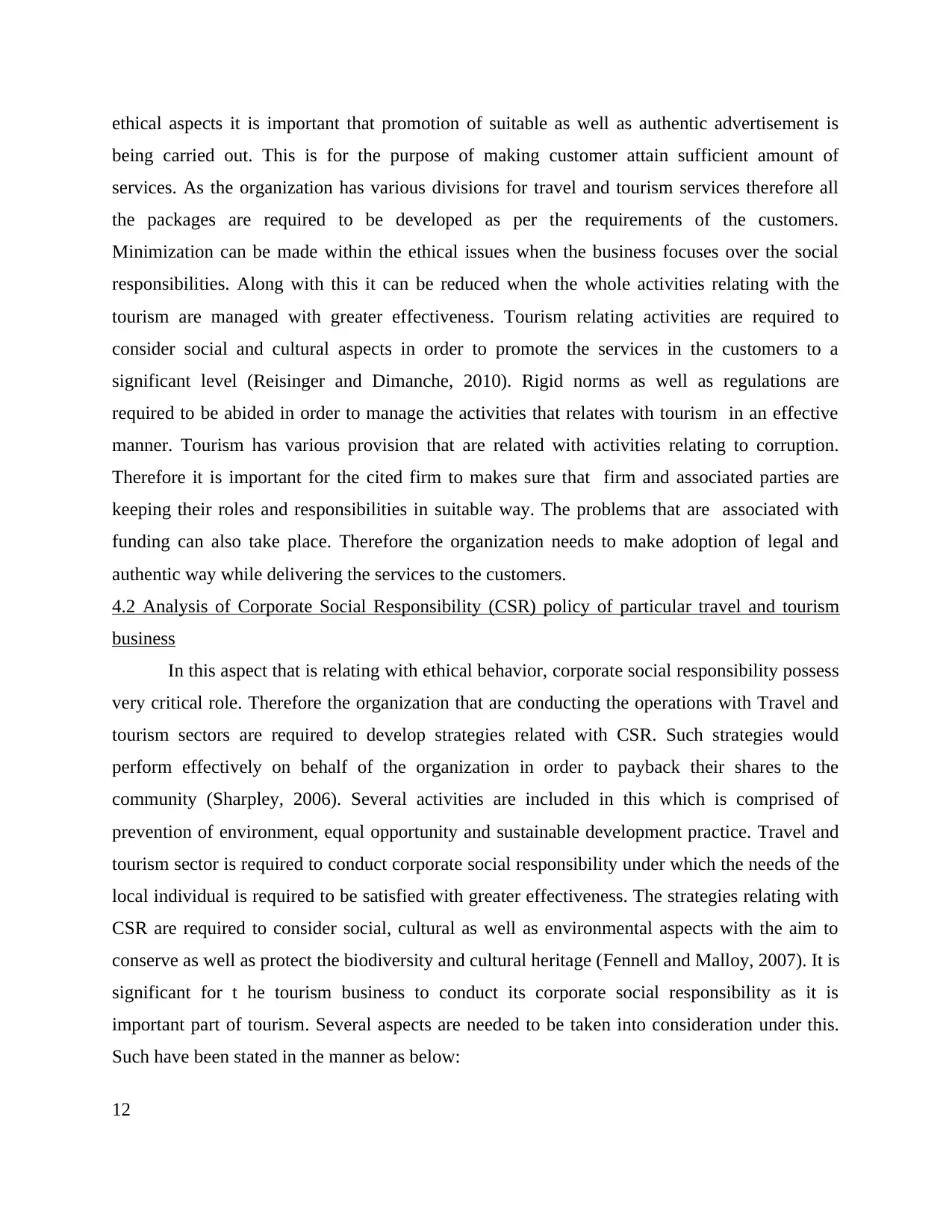
ethical aspects it is important that promotion of suitable as well as authentic advertisement is
being carried out. This is for the purpose of making customer attain sufficient amount of
services. As the organization has various divisions for travel and tourism services therefore all
the packages are required to be developed as per the requirements of the customers.
Minimization can be made within the ethical issues when the business focuses over the social
responsibilities. Along with this it can be reduced when the whole activities relating with the
tourism are managed with greater effectiveness. Tourism relating activities are required to
consider social and cultural aspects in order to promote the services in the customers to a
significant level (Reisinger and Dimanche, 2010). Rigid norms as well as regulations are
required to be abided in order to manage the activities that relates with tourism in an effective
manner. Tourism has various provision that are related with activities relating to corruption.
Therefore it is important for the cited firm to makes sure that firm and associated parties are
keeping their roles and responsibilities in suitable way. The problems that are associated with
funding can also take place. Therefore the organization needs to make adoption of legal and
authentic way while delivering the services to the customers.
4.2 Analysis of Corporate Social Responsibility (CSR) policy of particular travel and tourism
business
In this aspect that is relating with ethical behavior, corporate social responsibility possess
very critical role. Therefore the organization that are conducting the operations with Travel and
tourism sectors are required to develop strategies related with CSR. Such strategies would
perform effectively on behalf of the organization in order to payback their shares to the
community (Sharpley, 2006). Several activities are included in this which is comprised of
prevention of environment, equal opportunity and sustainable development practice. Travel and
tourism sector is required to conduct corporate social responsibility under which the needs of the
local individual is required to be satisfied with greater effectiveness. The strategies relating with
CSR are required to consider social, cultural as well as environmental aspects with the aim to
conserve as well as protect the biodiversity and cultural heritage (Fennell and Malloy, 2007). It is
significant for t he tourism business to conduct its corporate social responsibility as it is
important part of tourism. Several aspects are needed to be taken into consideration under this.
Such have been stated in the manner as below:
12
being carried out. This is for the purpose of making customer attain sufficient amount of
services. As the organization has various divisions for travel and tourism services therefore all
the packages are required to be developed as per the requirements of the customers.
Minimization can be made within the ethical issues when the business focuses over the social
responsibilities. Along with this it can be reduced when the whole activities relating with the
tourism are managed with greater effectiveness. Tourism relating activities are required to
consider social and cultural aspects in order to promote the services in the customers to a
significant level (Reisinger and Dimanche, 2010). Rigid norms as well as regulations are
required to be abided in order to manage the activities that relates with tourism in an effective
manner. Tourism has various provision that are related with activities relating to corruption.
Therefore it is important for the cited firm to makes sure that firm and associated parties are
keeping their roles and responsibilities in suitable way. The problems that are associated with
funding can also take place. Therefore the organization needs to make adoption of legal and
authentic way while delivering the services to the customers.
4.2 Analysis of Corporate Social Responsibility (CSR) policy of particular travel and tourism
business
In this aspect that is relating with ethical behavior, corporate social responsibility possess
very critical role. Therefore the organization that are conducting the operations with Travel and
tourism sectors are required to develop strategies related with CSR. Such strategies would
perform effectively on behalf of the organization in order to payback their shares to the
community (Sharpley, 2006). Several activities are included in this which is comprised of
prevention of environment, equal opportunity and sustainable development practice. Travel and
tourism sector is required to conduct corporate social responsibility under which the needs of the
local individual is required to be satisfied with greater effectiveness. The strategies relating with
CSR are required to consider social, cultural as well as environmental aspects with the aim to
conserve as well as protect the biodiversity and cultural heritage (Fennell and Malloy, 2007). It is
significant for t he tourism business to conduct its corporate social responsibility as it is
important part of tourism. Several aspects are needed to be taken into consideration under this.
Such have been stated in the manner as below:
12
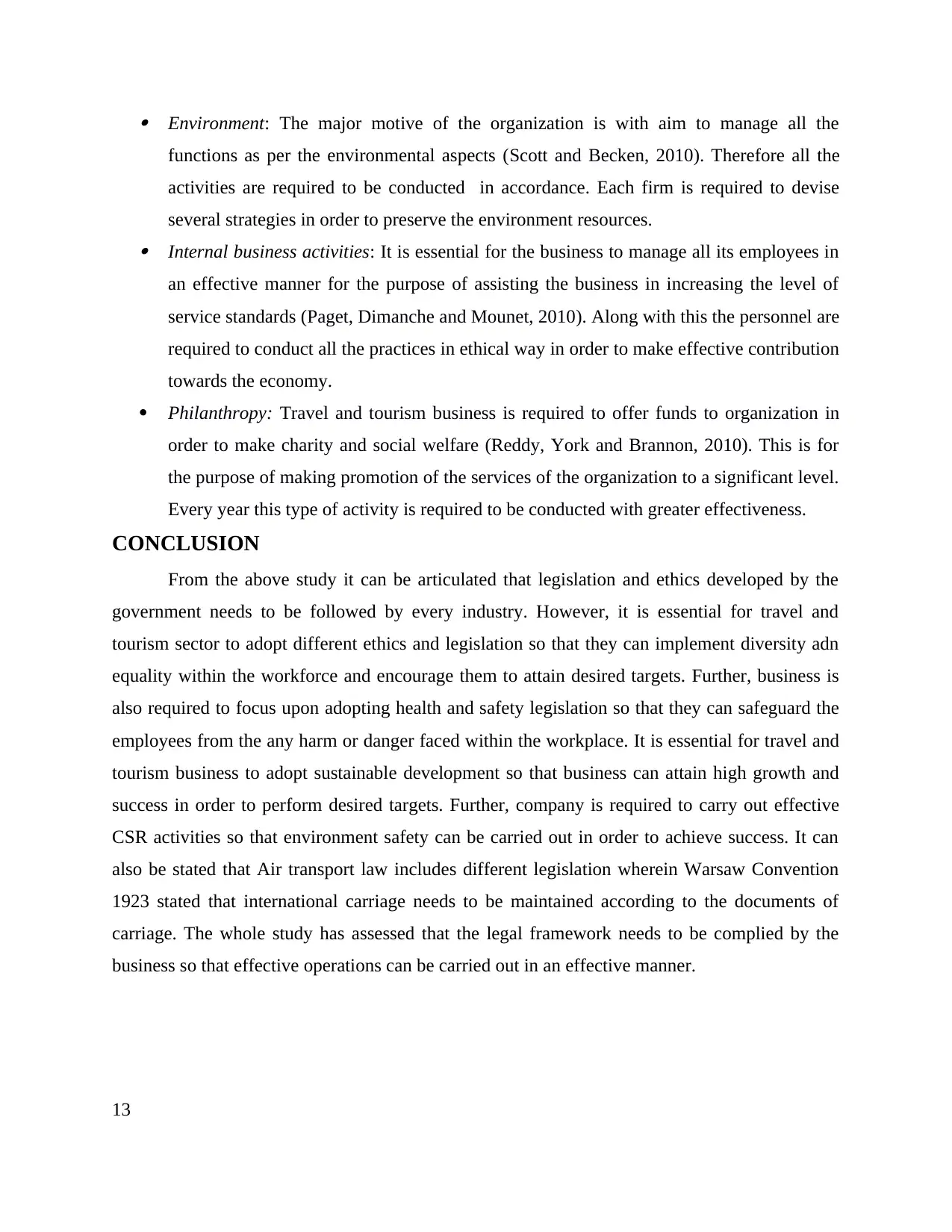
Environment: The major motive of the organization is with aim to manage all the
functions as per the environmental aspects (Scott and Becken, 2010). Therefore all the
activities are required to be conducted in accordance. Each firm is required to devise
several strategies in order to preserve the environment resources. Internal business activities: It is essential for the business to manage all its employees in
an effective manner for the purpose of assisting the business in increasing the level of
service standards (Paget, Dimanche and Mounet, 2010). Along with this the personnel are
required to conduct all the practices in ethical way in order to make effective contribution
towards the economy.
Philanthropy: Travel and tourism business is required to offer funds to organization in
order to make charity and social welfare (Reddy, York and Brannon, 2010). This is for
the purpose of making promotion of the services of the organization to a significant level.
Every year this type of activity is required to be conducted with greater effectiveness.
CONCLUSION
From the above study it can be articulated that legislation and ethics developed by the
government needs to be followed by every industry. However, it is essential for travel and
tourism sector to adopt different ethics and legislation so that they can implement diversity adn
equality within the workforce and encourage them to attain desired targets. Further, business is
also required to focus upon adopting health and safety legislation so that they can safeguard the
employees from the any harm or danger faced within the workplace. It is essential for travel and
tourism business to adopt sustainable development so that business can attain high growth and
success in order to perform desired targets. Further, company is required to carry out effective
CSR activities so that environment safety can be carried out in order to achieve success. It can
also be stated that Air transport law includes different legislation wherein Warsaw Convention
1923 stated that international carriage needs to be maintained according to the documents of
carriage. The whole study has assessed that the legal framework needs to be complied by the
business so that effective operations can be carried out in an effective manner.
13
functions as per the environmental aspects (Scott and Becken, 2010). Therefore all the
activities are required to be conducted in accordance. Each firm is required to devise
several strategies in order to preserve the environment resources. Internal business activities: It is essential for the business to manage all its employees in
an effective manner for the purpose of assisting the business in increasing the level of
service standards (Paget, Dimanche and Mounet, 2010). Along with this the personnel are
required to conduct all the practices in ethical way in order to make effective contribution
towards the economy.
Philanthropy: Travel and tourism business is required to offer funds to organization in
order to make charity and social welfare (Reddy, York and Brannon, 2010). This is for
the purpose of making promotion of the services of the organization to a significant level.
Every year this type of activity is required to be conducted with greater effectiveness.
CONCLUSION
From the above study it can be articulated that legislation and ethics developed by the
government needs to be followed by every industry. However, it is essential for travel and
tourism sector to adopt different ethics and legislation so that they can implement diversity adn
equality within the workforce and encourage them to attain desired targets. Further, business is
also required to focus upon adopting health and safety legislation so that they can safeguard the
employees from the any harm or danger faced within the workplace. It is essential for travel and
tourism business to adopt sustainable development so that business can attain high growth and
success in order to perform desired targets. Further, company is required to carry out effective
CSR activities so that environment safety can be carried out in order to achieve success. It can
also be stated that Air transport law includes different legislation wherein Warsaw Convention
1923 stated that international carriage needs to be maintained according to the documents of
carriage. The whole study has assessed that the legal framework needs to be complied by the
business so that effective operations can be carried out in an effective manner.
13
Paraphrase This Document
Need a fresh take? Get an instant paraphrase of this document with our AI Paraphraser
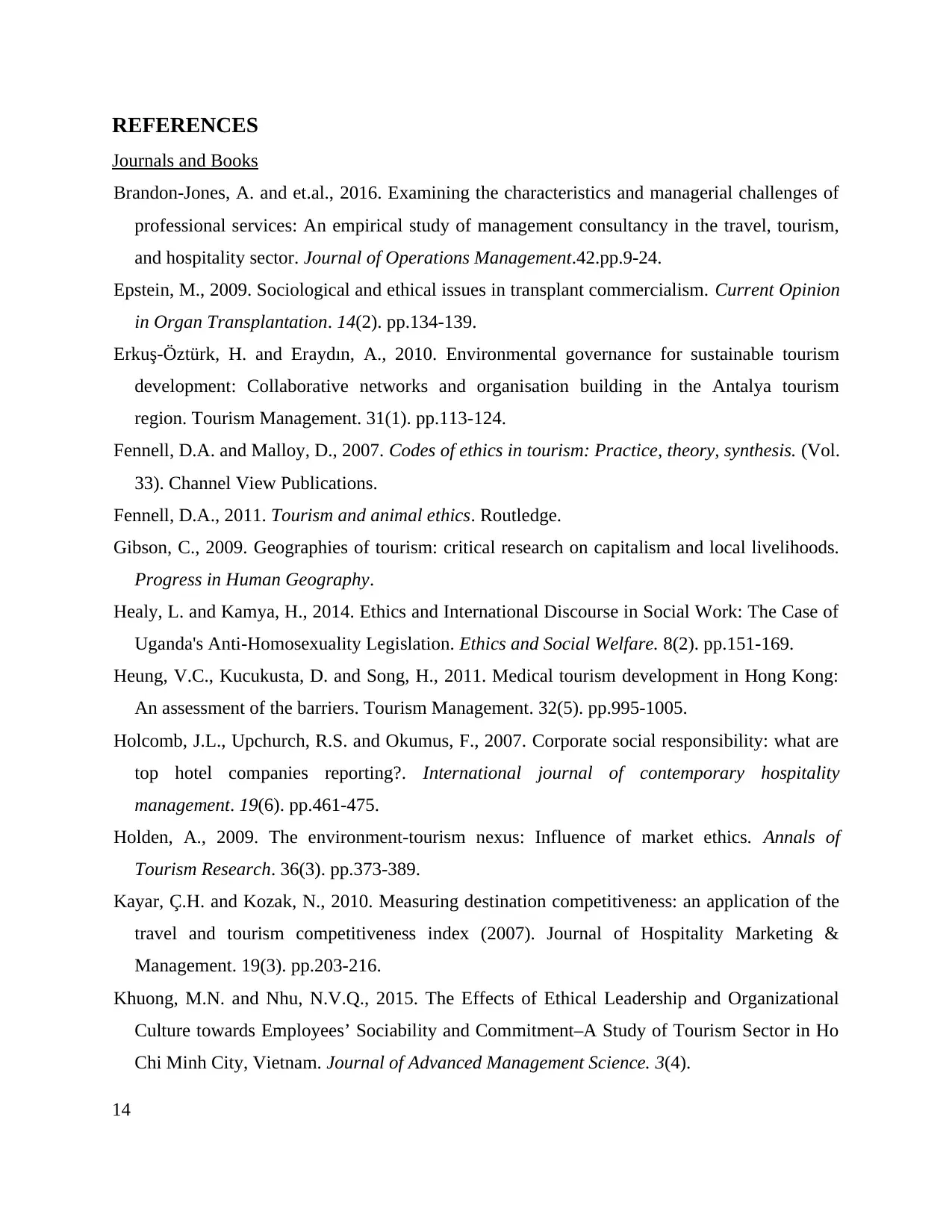
REFERENCES
Journals and Books
Brandon-Jones, A. and et.al., 2016. Examining the characteristics and managerial challenges of
professional services: An empirical study of management consultancy in the travel, tourism,
and hospitality sector. Journal of Operations Management.42.pp.9-24.
Epstein, M., 2009. Sociological and ethical issues in transplant commercialism. Current Opinion
in Organ Transplantation. 14(2). pp.134-139.
Erkuş-Öztürk, H. and Eraydın, A., 2010. Environmental governance for sustainable tourism
development: Collaborative networks and organisation building in the Antalya tourism
region. Tourism Management. 31(1). pp.113-124.
Fennell, D.A. and Malloy, D., 2007. Codes of ethics in tourism: Practice, theory, synthesis. (Vol.
33). Channel View Publications.
Fennell, D.A., 2011. Tourism and animal ethics. Routledge.
Gibson, C., 2009. Geographies of tourism: critical research on capitalism and local livelihoods.
Progress in Human Geography.
Healy, L. and Kamya, H., 2014. Ethics and International Discourse in Social Work: The Case of
Uganda's Anti-Homosexuality Legislation. Ethics and Social Welfare. 8(2). pp.151-169.
Heung, V.C., Kucukusta, D. and Song, H., 2011. Medical tourism development in Hong Kong:
An assessment of the barriers. Tourism Management. 32(5). pp.995-1005.
Holcomb, J.L., Upchurch, R.S. and Okumus, F., 2007. Corporate social responsibility: what are
top hotel companies reporting?. International journal of contemporary hospitality
management. 19(6). pp.461-475.
Holden, A., 2009. The environment-tourism nexus: Influence of market ethics. Annals of
Tourism Research. 36(3). pp.373-389.
Kayar, Ç.H. and Kozak, N., 2010. Measuring destination competitiveness: an application of the
travel and tourism competitiveness index (2007). Journal of Hospitality Marketing &
Management. 19(3). pp.203-216.
Khuong, M.N. and Nhu, N.V.Q., 2015. The Effects of Ethical Leadership and Organizational
Culture towards Employees’ Sociability and Commitment–A Study of Tourism Sector in Ho
Chi Minh City, Vietnam. Journal of Advanced Management Science. 3(4).
14
Journals and Books
Brandon-Jones, A. and et.al., 2016. Examining the characteristics and managerial challenges of
professional services: An empirical study of management consultancy in the travel, tourism,
and hospitality sector. Journal of Operations Management.42.pp.9-24.
Epstein, M., 2009. Sociological and ethical issues in transplant commercialism. Current Opinion
in Organ Transplantation. 14(2). pp.134-139.
Erkuş-Öztürk, H. and Eraydın, A., 2010. Environmental governance for sustainable tourism
development: Collaborative networks and organisation building in the Antalya tourism
region. Tourism Management. 31(1). pp.113-124.
Fennell, D.A. and Malloy, D., 2007. Codes of ethics in tourism: Practice, theory, synthesis. (Vol.
33). Channel View Publications.
Fennell, D.A., 2011. Tourism and animal ethics. Routledge.
Gibson, C., 2009. Geographies of tourism: critical research on capitalism and local livelihoods.
Progress in Human Geography.
Healy, L. and Kamya, H., 2014. Ethics and International Discourse in Social Work: The Case of
Uganda's Anti-Homosexuality Legislation. Ethics and Social Welfare. 8(2). pp.151-169.
Heung, V.C., Kucukusta, D. and Song, H., 2011. Medical tourism development in Hong Kong:
An assessment of the barriers. Tourism Management. 32(5). pp.995-1005.
Holcomb, J.L., Upchurch, R.S. and Okumus, F., 2007. Corporate social responsibility: what are
top hotel companies reporting?. International journal of contemporary hospitality
management. 19(6). pp.461-475.
Holden, A., 2009. The environment-tourism nexus: Influence of market ethics. Annals of
Tourism Research. 36(3). pp.373-389.
Kayar, Ç.H. and Kozak, N., 2010. Measuring destination competitiveness: an application of the
travel and tourism competitiveness index (2007). Journal of Hospitality Marketing &
Management. 19(3). pp.203-216.
Khuong, M.N. and Nhu, N.V.Q., 2015. The Effects of Ethical Leadership and Organizational
Culture towards Employees’ Sociability and Commitment–A Study of Tourism Sector in Ho
Chi Minh City, Vietnam. Journal of Advanced Management Science. 3(4).
14
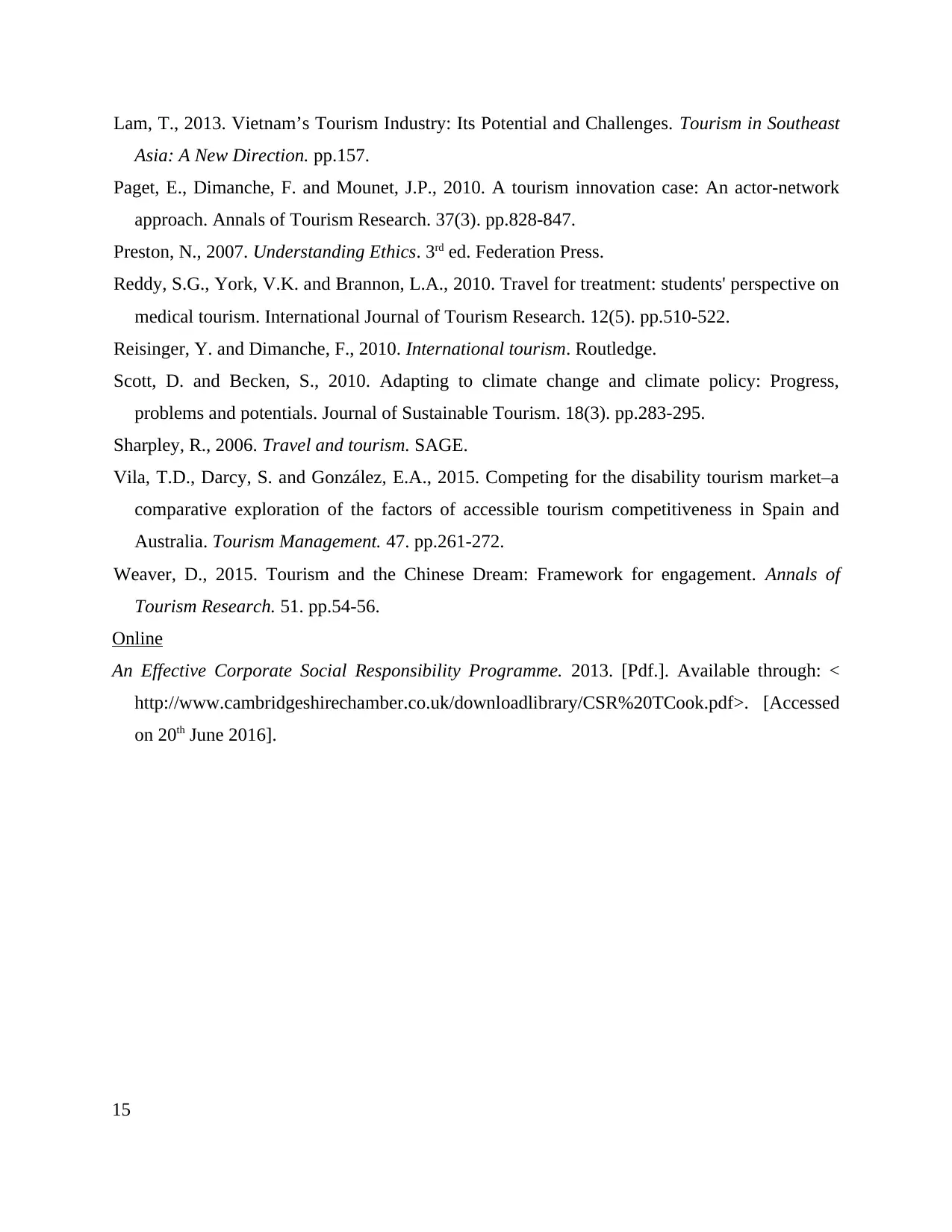
Lam, T., 2013. Vietnam’s Tourism Industry: Its Potential and Challenges. Tourism in Southeast
Asia: A New Direction. pp.157.
Paget, E., Dimanche, F. and Mounet, J.P., 2010. A tourism innovation case: An actor-network
approach. Annals of Tourism Research. 37(3). pp.828-847.
Preston, N., 2007. Understanding Ethics. 3rd ed. Federation Press.
Reddy, S.G., York, V.K. and Brannon, L.A., 2010. Travel for treatment: students' perspective on
medical tourism. International Journal of Tourism Research. 12(5). pp.510-522.
Reisinger, Y. and Dimanche, F., 2010. International tourism. Routledge.
Scott, D. and Becken, S., 2010. Adapting to climate change and climate policy: Progress,
problems and potentials. Journal of Sustainable Tourism. 18(3). pp.283-295.
Sharpley, R., 2006. Travel and tourism. SAGE.
Vila, T.D., Darcy, S. and González, E.A., 2015. Competing for the disability tourism market–a
comparative exploration of the factors of accessible tourism competitiveness in Spain and
Australia. Tourism Management. 47. pp.261-272.
Weaver, D., 2015. Tourism and the Chinese Dream: Framework for engagement. Annals of
Tourism Research. 51. pp.54-56.
Online
An Effective Corporate Social Responsibility Programme. 2013. [Pdf.]. Available through: <
http://www.cambridgeshirechamber.co.uk/downloadlibrary/CSR%20TCook.pdf>. [Accessed
on 20th June 2016].
15
Asia: A New Direction. pp.157.
Paget, E., Dimanche, F. and Mounet, J.P., 2010. A tourism innovation case: An actor-network
approach. Annals of Tourism Research. 37(3). pp.828-847.
Preston, N., 2007. Understanding Ethics. 3rd ed. Federation Press.
Reddy, S.G., York, V.K. and Brannon, L.A., 2010. Travel for treatment: students' perspective on
medical tourism. International Journal of Tourism Research. 12(5). pp.510-522.
Reisinger, Y. and Dimanche, F., 2010. International tourism. Routledge.
Scott, D. and Becken, S., 2010. Adapting to climate change and climate policy: Progress,
problems and potentials. Journal of Sustainable Tourism. 18(3). pp.283-295.
Sharpley, R., 2006. Travel and tourism. SAGE.
Vila, T.D., Darcy, S. and González, E.A., 2015. Competing for the disability tourism market–a
comparative exploration of the factors of accessible tourism competitiveness in Spain and
Australia. Tourism Management. 47. pp.261-272.
Weaver, D., 2015. Tourism and the Chinese Dream: Framework for engagement. Annals of
Tourism Research. 51. pp.54-56.
Online
An Effective Corporate Social Responsibility Programme. 2013. [Pdf.]. Available through: <
http://www.cambridgeshirechamber.co.uk/downloadlibrary/CSR%20TCook.pdf>. [Accessed
on 20th June 2016].
15
1 out of 15
Related Documents
Your All-in-One AI-Powered Toolkit for Academic Success.
+13062052269
info@desklib.com
Available 24*7 on WhatsApp / Email
![[object Object]](/_next/static/media/star-bottom.7253800d.svg)
Unlock your academic potential
© 2024 | Zucol Services PVT LTD | All rights reserved.




